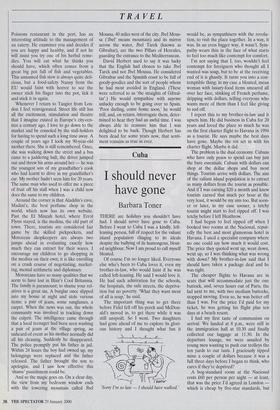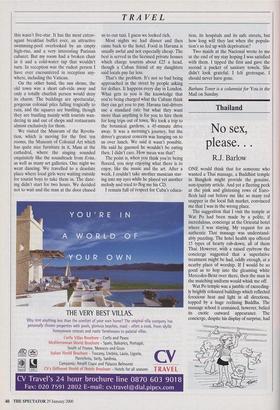Cuba
I should never have gone
Barbara Toner
THERE are holidays you shouldn't have had. I should never• have gone to Cuba. Before I went to Cuba I was a kindly, left- leaning person, full of respect for the valiant island population clinging to its ideals despite the bullying of its humongous, bloat- ed neighbour. Now I am proud to call myself bloated.
Of course I'm no longer liked. Everyone else who's been to Cuba loves it, even my brother-in-law, who would faint if he was called left-leaning. He said I would love it. He had such admiration for the schools, the hospitals, the safe streets, the depriva- tion but no poverty. 'What they want most of all is soap,' he said.
The important thing was to get there before Fidel fell off his perch and McDon- ald's moved in, to get there while it was still unspoilt. So I went. Two daughters had gone ahead of me to explore its glori- ous history and I thought what fun it 'Sony I'm. so late — I should have walked.' would be, as sympathisers with the revolu- tion, to visit the place together. In a way, it was. In an even bigger way, it wasn't. Sym- pathy wears thin in the face of what starts to feel too much like contempt for comfort.
I'm not saying that I, too, wouldn't feel contempt for foreigners who thought all I wanted was soap, but to be at the receiving end of it is ghastly. It turns you into a con- temptible thing; in my case a bloated, mean woman with luxury-food items smeared all over her face, stinking of French perfume, dripping with dollars, telling everyone who wants more of them than I feel like giving to sod off.
I report this to my brother-in-law and it upsets him. He did business in Cuba for 20 years and loved the place so much he was on the first charter flight to Havana in 1994 as a tourist. He says maybe the best days have gone. Maybe the rot set in with his charter flight. Maybe it did.
The problem is the dual economy. Cubans who have only pesos to spend can buy just the bare essentials; Cubans with dollars can shop at the dollar shops and buy most things. Tourists arrive with dollars. The aim of the valiant island population is to extract as mangy dollars from the tourist as possible. And if I was earning $20 a month and knew tourists earned that much per hour at the very least, it would be my aim too. But soon- er or later, in my case sooner, a tetchy tourist might start to feel ripped off. I was tetchy before I left Heathrow.
I had begun to feel ripped off when I booked two rooms at the Nacional, reput- edly the best and most glamorous hotel in Havana. I used a specialist company where no one could say how much it would cost. The price they quoted went up, went down, went up, so I was thinking what was wrong with down? My brother-in-law said that I should have taken a package deal and he was right.
The cheaper flights to Havana are in seats that will accommodate just the one buttock, and, seven hours out of Paris, the lad next to me, with two medium buttocks, stopped moving. Even so, he was better off than I was. For the price I'd paid for my ticket, he was getting his flight plus ten days at a beach resort.
I had my first taste of communism on arrival. We landed at 8 p.m., were still in the immigration hall at 10.30 and finally collected our luggage at 11.30. In the departure lounge, we were assailed by young men wanting to push our trolleys the ten yards to our taxis. I graciously tipped mine a couple of dollars because it was a full three days before I began to think, who cares if they're deprived?
A bog-standard room at the Nacional costs £.60 per person per night — at least, that was the price I'd agreed in London — which is cheap by five-star standards, but this wasn't five-star. It has the most extrav- agant breakfast buffet ever, an attractive swimming-pool overlooked by an empty high-rise, and a very interesting Parisian cabaret. But my room had a broken chair in it and a cold-water tap that wouldn't turn. In reception was the rudest person I have ever encountered in reception any- where, including the Vatican.
On the other hand, the sun shone, the old town was a short cab-ride away and only a totally churlish person would deny its charm. The buildings are spectacular, gorgeous colonial piles falling tragically to ruin, and the squares are bustling, though they are bustling mainly with tourists wan- dering in and out of shops and restaurants almost exclusively for them.
We visited the Museum of the Revolu- tion, which is moving for the first ten rooms, the Museum of Colonial Art which has quite nice furniture in it, Mass at the cathedral, where the singing sounded exquisitely Re the soundtrack from Evita, as well as many art galleries. One night we went dancing. We travelled to a desolate place where local girls were waiting outside for tourist boys to take them in. The danc- ing didn't start for two hours. We decided not to wait and the man at the door chased us to our taxi. I guess we looked rich.
Most nights we had dinner and then came back to the hotel. Food in Havana is usually awful and not especially cheap. The best is served in the licensed private houses which charge tourists about £25 a head, though a Cuban friend of my daughters said locals pay far less.
That's the problem. It's not so bad being approached in the street by people asking for dollars. It happens every day in London. What gets to you is the knowledge that you're being charged what the Cubans think they can get you to pay. Havana taxi-drivers use a standard rate but what they want more than anything is for you to hire them for long trips out of town. We took a trip to the botanical gardens, a 45-minute drive away. It was a morning's journey, but the driver's greatest concern was hanging on to us over lunch. We said it wasn't possible. He said he guessed he wouldn't be eating then. I didn't care. How mean was that?
The point is, when you think you're being fleeced, you stop enjoying what there is to enjoy, like the music and the art. After a week, I couldn't take another musician star- ing into my eyes while he played yet another melody and tried to flog me his CD.
I remain full of respect for Cuba's educa- tion, its hospitals and its safe streets, but how long will they last when the popula- tion's so fed up with deprivation?
Two maids at the Nacional wrote to me at the end of my stay hoping I was satisfied with them. I tipped the first and gave the second a packet of sanitary towels. She didn't look grateful. I felt grotesque. I should never have gone.
Barbara Toner is a columnist for You in the Mail on Sunday.



















































































 Previous page
Previous page